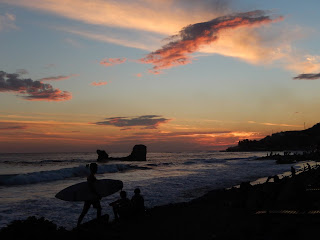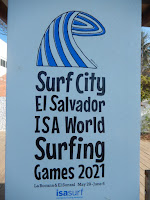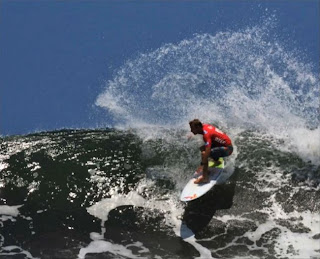Tourism growth in El Salvador
Let me start out by saying that tourists should come to El Salvador. The countryside from its miles of beaches to its mountains and volcanos is filled with beautiful vistas. The food is varied and delicious. The people are warm and friendly. The former headlines about El Salvador's homicide rate do not (and never did) reflect the level of danger to tourists, who have never been a target of the gangs.
The government of El Salvador recognizes the importance of tourism and has been heavily promoting it. Most prominent is its "Surf City" campaign promoting kilometers of Pacific coastline where the waves are championship size and the sunsets are stunning.
An article in Travel + Leisure wrote about How El Salvador Became a World-class Destination for Surfers:The small towns surrounding the beaches in La Libertad have seen significant investment in recent years, mostly in relation to its surf scene. A number of mid-range to luxury hotels have popped up right by the water, including Casa De Mar and Palo Verde Hotel, a boutique property in El Zonte that focuses on sustainability. A new highway was constructed that connects San Salvador to the coast, making it easier for visitors to get from the airport to the beaches quickly.
According to WorldData.Info, using data from the World Tourist Organization, El Salvador saw 707,000 tourists in 2020, ranking it 113th in the world, and with a rate of 0.11 tourists per local resident, El Salvador ranked 118th. Of course, 2020 was the first year of the pandemic, and El Salvador had closed its international airport to flights in and out for almost half the year.
The airport was open for all of 2021, and we can compare the pre-pandemic 2019 numbers with the numbers for 2021. According to data from El Salvador's migration ministry (DGME), in 2019 1,301,632 persons entered the country through El Salvador's airports. In 2021, the number was 1,152,135. So 2021 arriving passenger numbers still have not caught up to 2019, and were still 11% below pre-pandemic levels.
Despite these statistics on arriving air travelers, the government of El Salvador recently told the world that there had been a 30% increase in tourism in November and December 2021. (How the increase was measured was not indicated). The government attributed the increase to Nayib Bukele's Bitcoin initiative which made the crypto-currency legal tender in the country.
Any number of outlets uncritically republished the claim of Bitcoin's effect on tourism. The journalists who just republished this statement without critically thinking about it made the basic mistake of confusing correlation and causation. Bitcoin may have been "legal tender" since September at the same time that tourism increased, but that does not mean that Bitcoin was the cause of increased tourism. (Being sent by your editor to cover Bitcoin in El Salvador and staying at El Zonte, "Bitcoin Beach", does not make you a representative sample of the world's tourists).
In November 2021, El Salvador's Mnistry of Tourism noted a surge of travel over the US Thanksgiving holidays, and noted several reasons, with Bitcoin barely mentioned.
Other reasons which help explain the strength of El Salvador's tourism sector:
- A lower (safer) level travel advisory from the US State Department than neighboring countries.
- The Salvadoran economy has been entirely open throughout 2021.
- The country's tourism promotion campaigns are paying off.
- The El Salvador tourism website run by the government is a step above anything done by prior administrations.
The average tourist (not the Bitcoin enthusiast) is not going to travel to El Salvador because they can pay with Bitcoin at certain locations like Starbucks and McDonald's. The average tourist is travelling with a credit card and would rather use a credit card, with fraud protection and with time to pay, rather than a Bitcoin wallet. Paying with a Bitcoin wallet, which is more like just using cash or even a debit card, is a novelty, but not something many people schedule a vacation around.
And for the occasional person drawn here to try to find the Bitcoin economy of El Salvador, there are: 5 tips for traveling in El Salvador spending only Bitcoin and Around El Salvador in 45 days: A Bitcoin-only travel story.
Even in El Salvador's Surf City corridor, I have found that most establishments were not accepting Bitcoin. In my own informal survey in Surf City two weeks ago, the beach hotel where I stayed, the two popular restaurants where I ate, and the bar which recently was site of a large party for Bitcoin promoters, all told me that they are not accepting payment in Bitcoin. In San Salvador at the artisan market which caters to tourists and is only a few block from Bukele's Presidential Palace, I was told that only one of the dozens of vendors there accepts Bitcoin. Sure, if I want to search out establishments in El Salvador which accept Bitcoin I can find them, but they are a very small minority of businesses.
But it is also clear to me that foreign tourism had increased. In a survey of upscale hotels catering to North American tourists in the Surf City area, I found that most were fully booked mid-week in a non-vacation week in February. That would not have been the case in 2018 and earlier. At the hotel where we were staying, there were a wide variety of travelers, at least two thirds speaking English, and none of them were there, as far as I could tell, in order to enjoy the Bitcoin economy.
So the Salvadoran government can take credit for having made a concerted effort to enhance the tourism potential of El Salvador. That's a positive for the country and I hope it continues. Just don't try to convince me that Bitcoin, rather than sunsets over the Pacific and pupusas hot off the griddle, are what is driving most of the increase in visits.




Comments
GOOD PIECE tIM